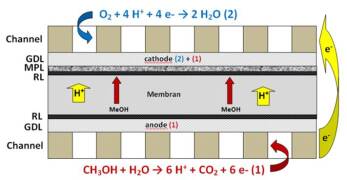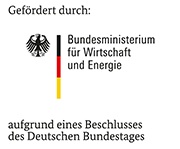17955BG-3

| Laufzeit: | 01.12.2013 - 30.11.2016 |
|---|---|
| Partner: | Institut für Chemische Verfahrenstechnik, Universität Stuttgart, (ICVT) Zentrum für Sonnenenergie- u. Wasserstoff-Forschung, Ulm (ZSW) |
| Geldgeber: | AiF e.V. (Arbeitsgemeinschaft industrieller Forschung) |
| Bearbeiter: | Sakthivel Mariappan |
| Arbeitsgruppe: | Technische Chemie |
Background
Liquid fuel such as methanol have an about 3 times higher energy density than that of 700 bar pressurized hydrogen. However several drawbacks such as poor kinetics of methanol oxidation and methanol crossover to the cathode drastically lower energy efficiency and fuel yield (figure 1) in Direct Methanol Fuel Cell (DMFC). One strategy to enhance overall efficiency consists on increasing cell working temperature up to 100-150°C.

Figure 1: Principle of DMFC
Objectives
This project aims at the development of a middle-temperature DMFC (MT-DMFC) with reduced cathodic air pressure and is structured in three major fields. The first one is devoted to the development of novel polymer membranes with low methanol permeation rate (ICVT, University of Stuttgart). The second one deals with the preparation of highly efficient and selective carbon-supported Pt and Pt bimetal catalysts for oxygen reduction in presence of methanol (DECHEMA-Forschungsinstitut). The ultimate goal is the construction of a five-cells stack assembly (ZSW, Ulm).
zurück
Das IGF-Vorhaben Nr. 17955BG-3 der Forschungsvereinigung DECHEMA e.V., Theodor-Heuss-Allee 25, 60486 Frankfurt am Main wurde über die AiF im Rahmen des Programms zur Förderung der industriellen Gemeinschaftsforschung (IGF) vom Bundesministerium für Wirtschaft und Energie aufgrund eines Beschlusses des Deutschen Bundestages gefördert.
Dr.-Ing. Jean-François Drillet
Tel.: 069 / 75 64-476
E-Mail: drillet
M. Sakthivel, J.-F. Drillet, Applied Catalysis B: Environmental, 231 (2018), 62-72